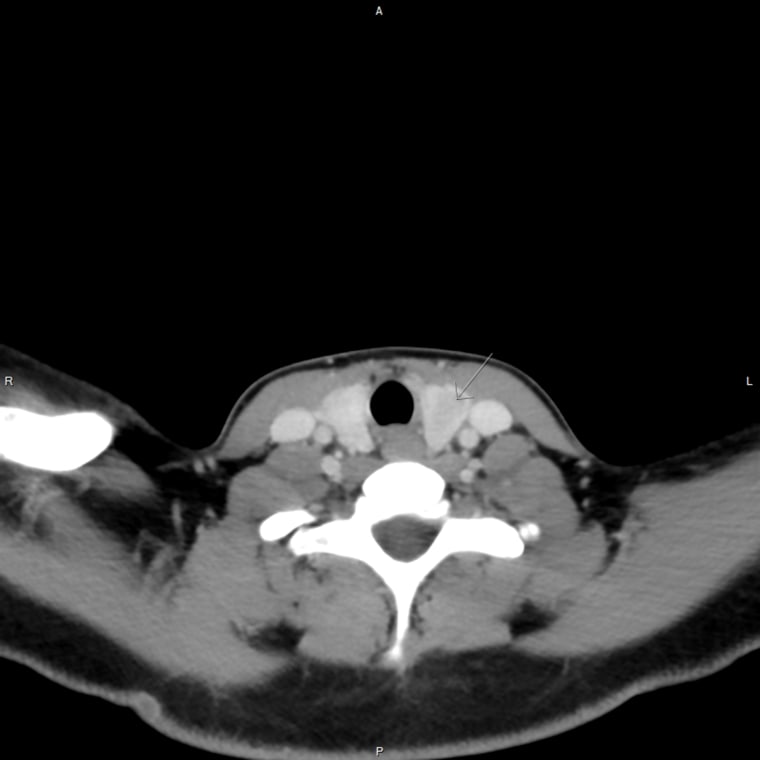This winter, Aubrie Cogan noticed a swelling in her neck, behind her ear.
At first, she didn’t think much of it. She didn't feel sick, just a little run down. She thought maybe it was stress causing inflammation.
But, the lump never went away. After three months, she was worried and scheduled an appointment with a doctor.
“I had a gut feeling there was something pretty wrong,” Cogan, 27, of Brooklyn, told TODAY. “My nickname is ‘bad luck Brie’ and I was pretty paranoid.”

When she visited Dr. Catherine Sinclair, director of head and neck surgery at Mount Sinai West, for an exam, the doctor performed an ultrasound on her neck and throat.
Sinclair discovered something worrisome, but it wasn't what either expected.
“When I looked at that lymph node, I wasn’t concerned,” Sinclair told TODAY.
But, as she always does, the doctor also checked Cogan's thyroid -- and, after a biopsy, she found the problem.
"We were able to see all of these unusual features that are diagnostic of thyroid cancer,” Sinclair said.
While she had braced herself for the worst, Cogan said she is still struggling to accept that she has thyroid cancer and at this stage of her life.
“I am only 27," she said. "(Having cancer) was kind of difficult to wrap my head around."
Thyroid cancer is common in women, Sinclair said. About 50,000 people a year are diagnosed and it affects women about three times as often as men.
Cogan was expecting that the swollen lymph node that had been bothering her was the problem.
“I was really surprised to learn that the lump wasn’t cancer,” she said.
Though it's a common symptom, having a swollen lymph node doesn’t necessarily mean that a person has cancer.
“Of the people we see with (enlarged) lymph nodes in their neck, most of them won’t have a malignancy,” Sinclair said.

Risk factors for thyroid cancer include:
- A family history
- Living close to a nuclear site
- Undergoing radiation therapy (for neck or breast cancer)
Cogan is the first in her family to have thyroid cancer, though she said members of her family have had other types of cancer.
“She had no risk factors and the majority of the people we see do not have risk factors," Sinclair said. "They have sporadic thyroid cancer basically occurring from an unknown cause.”
“Other than people with risk factors, we don’t know why people develop this disease,” she added.
Many people with thyroid cancer have what seem like swollen lymph nodes or nodules in the neck and Cogan's proactive behavior helped doctors catch it early.
“The most common symptom that we see with thyroid cancer include the lump in the neck, like Aubrie,” Sinclair explained.
People can also experience:
- Vocal hoarseness
- Shortness of breath
- Difficulty of swallowing
But these signs are normally found when the cancer is “larger and invading,” according to Sinclair.
“Thyroid disease can be quite silent until a late stage,” she said.
Cogan received surgery to remove her thyroid and four lymph nodes where the cancer had spread. She may need to take a one-time radiation pill to reduce her chance of recurrence.
While many patients respond well to the treatment, doctors have to monitor for recurrence.
“One of the factors that influences whether the cancer comes back is the number of lymph nodes involved,” Sinclair explained.

Cogan said she has some lingering hoarseness from surgery, but otherwise is recovering well. She'll be returning to Hunter College for the fall semester, her last before graduation. She plans to go to graduate school next.
After her experience, she offered this advice to other people who have swelling that doesn't seem to get better.
“A lot of people just attribute any type of (swollen) lymph node to stress,” she said. “I would advise them to go to the doctor. Even if it is nothing, it is better to be safe than sorry.”









